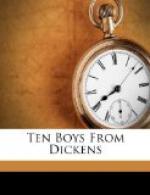For some days afterwards, the neighbouring country was overrun with boys, who, the report went, had been secretly furnished by Mr. and Mrs. Browdie, not only with a hearty meal of bread and meat, but with sundry shillings and sixpences to help them on their way.
There were a few timid young children, who, miserable as they had been, and many as were the tears they had shed in the wretched school, still knew no other home, and had formed for it a sort of attachment which made them weep when the bolder spirits fled, and cling to it as a refuge. Of these, some were found crying under hedges and in such places, frightened at the solitude. One had a dead bird in a little cage; he had wandered nearly twenty miles, and when his poor favourite died, lost courage, and lay down beside him. Another was discovered in a yard hard by the school, sleeping with a dog, who bit at those who came to remove him, and licked the sleeping child’s pale face.
They were taken back, and some other stragglers were recovered, but by degrees they were all claimed, and, in course of time, Dotheboys Hall and its last breaking up began to be forgotten by the neighbours, or to be only spoken of as among things that had been.
DAVID COPPERFIELD
[Illustration: LITTLE EM’LY AND DAVID COPPERFIELD.]
The first things that assume shape and form in the recollections of my childhood are my mother, with her pretty hair and youthful shape, and Peggotty, our faithful serving maid, with no shape at all, and eyes so dark that they seemed to darken their whole neighbourhood in her face, and cheeks and arms so hard and red that I wonder the birds didn’t peck her in preference to apples.
What else do I remember?—let me see. There comes to me a vision of our home, Blunderstone Rookery, with its ground-floor kitchen, and long passage leading from it to the front door. A dark store-room opens out of the kitchen, and in it there is the smell of soap, pickles, pepper, candles, and coffee, all at one whiff. Then there are the two parlours;—the one in which we sit of an evening, my mother and I and Peggotty,—for Peggotty is quite our companion,—and the best parlour where we sit on a Sunday; grandly, but not so comfortably, while my mother reads the old familiar Bible stories to us.
And now I see the outside of our house, with the latticed bedroom windows, and the ragged old rooks’ nests dangling in the elm-trees. I see the garden—a very preserve of butterflies, where the pigeon house and dog-kennel are, and the fruit trees. And I see again my mother winding her bright curls around her fingers, and nobody is as proud of her beauty as I am.
One night when Peggotty and I had been sitting cosily by the parlour fire, my mother came home from spending the evening at a neighbour’s, and with her was a gentleman with beautiful black hair and whiskers. As my mother stooped to kiss me, the gentleman said I was a more highly privileged little fellow than a monarch.




